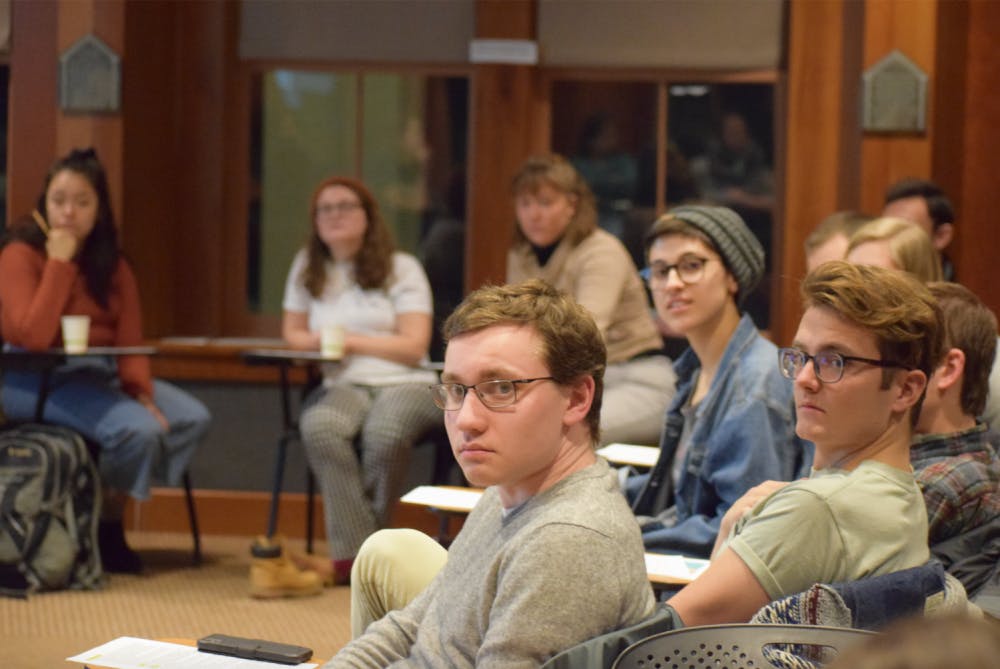[gallery ids="42761,42762,42759"]
A mixture of frustration, optimism and anger characterized a student teach-in on the proposed changes to Middlebury's protest policy last Friday. Held in the Hillcrest Orchard, the teach-in allowed students to share concerns about the proposed policy’s lack of transparency and potential ramifications.
The newly drafted protest policy was published online in November as a potential replacement to the existing policy. The proposal sought to resolve areas of ambiguity in the college’s existing policy (read our coverage of the new policy here).
At the beginning of the teach-in, attendees picked up copies of the proposed policy changes, which can be found at go.middlebury.edu/newprotestpolicy. Sarah Koch ’18.5 asked students to read aloud the definitions of the terms “expressive activity,” “disruption,” and “civil disobedience” as listed at the end of the policy, and participants responded that they feared the vague definitions would give the college disciplinary leeway while limiting student autonomy.
[pullquote speaker="Emma Ronai-Durning '18.5" photo="" align="center" background="on" border="all" shadow="on"]I feel like the administration hasn’t listened to any of the feedback it’s gotten in the past, so I feel skeptical about the policy reflecting what students are actually saying.[/pullquote]
Teach-in participants also cited frustration with the open meetings General Counsel Hannah Ross held last October and November. At the meetings Ross, the main administrator involved in drafting policy changes, explained the upcoming changes to the Middlebury Handbook and provided an overview of the work by Envisioning Middlebury, the Committee on Speech and Inclusion and college faculty.
Some attendees said they saw the fall meetings as the college’s ingenuine attempt to show interest in student input.
“I feel like the administration hasn’t listened to any of the feedback it’s gotten in the past, so I feel skeptical about the policy reflecting what students are actually saying,” said Emma Ronai-Durning ’18.5, one of the organizers of the teach-in.
Taite Shomo ’20.5, another organizer, asked participants whether they thought students’ and community members’ voices were being heard.
“We feel like we’re not being listened to,” said one student in response. The student went on to describe how the Student Government Association (SGA) bill that was intended to protect students engaging in protest was not incorporated into the new measures.
Another student said that the policy did not reflect the recommendations the Committee on Speech and Inclusion made in their report last January. In the recommendations, the committee emphasized the importance of changing campus culture over changing policy to address issues of free speech and protest.
All who spoke during the discussion agreed that the revisions were, at best, unclear and inflexible. Wengel Kifle ’20, who attended both the teach-in and Ross’s meeting in October, said she believed there was “really no room for change in the idea [Ross] was proposing.”
Students also expressed concerns that the policy changes would ultimately lead to the penalization of students and staff while leaving tenured professors exempt from blame. They also speculated that violations of the policy would prevent new professors from receiving tenure.
A key point of uncertainty during the discussion was whether the policy sufficiently outlined the process of selecting and vetting speakers, and the absence of accountability for that body.
Participants pointed out the lack of examples of acceptable and unacceptable behavior included in the new policy, compared to the existing version. The new policy does not provide the college’s expected response, either, leaving students protesters unsure about the consequences of their actions and making students on the Community Judicial Board responsible for determining their peers’ punishments.
One student said the proposed policy only addressed student behavior and not students’ motivation. Another pointed out that the policy made no mention of compounding disciplinary violations.
Several participants found fault in the new policy’s stance against “deliberate and significant disruption,” with disruption defined as “behavior that impairs or prevents expressive activity of others, or obstructs Middlebury’s activities or essential operations,” and prohibited disruption considered “all behavior that significantly disrupts Middlebury events, activities, programs and/or operations.”
“What if intentions aren’t disruptive?” one student said. Another argued that disruption is necessary for people to express opinions and suppressing it is counter to the point of a liberal arts institution.
[pullquote speaker="" photo="" align="center" background="on" border="all" shadow="on"]Fighting for justice, standing up for justice and academic security should not be at odds with each other.[/pullquote]
“I think the ugliness of policy surrounding protest and compounding punishment has suppressed speech on this campus already,” Koch said.
Toward the end of the teach-in, organizers handed out slips of paper and asked participants to respond to the following prompt: “What do we want our protest policy to look like? What would we like to be possible at Middlebury?”
“Fighting for justice, standing up for justice and academic security should not be at odds with each other,” one student said in response. Others said that the policy should focus more on the content of protests, and that people should have a clear understanding of what’s allowed, what’s not, and what the consequences will be.
As one student put it, “Where’s the line? If I cross it, what happens to me?”
In conclusion, Ronai-Durning urged everyone present to find something they are passionate about and to try and change it.
“There’s lots one can do without being punished for it,” she said.
Students Critique Proposed Protest Policy at Teach-in

Comments



